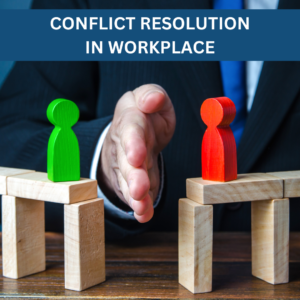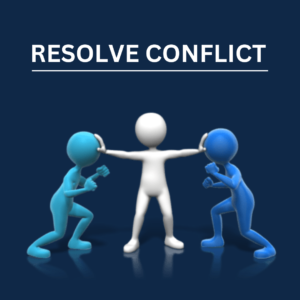Conflict is an inevitable part of any workplace. Whether it’s a difference in opinions, competing interests, or interpersonal tensions, conflicts can arise in various forms. Effective conflict management is crucial for maintaining a healthy work environment, fostering collaboration, and ensuring productivity. This article explores key strategies for managing conflicts effectively, enabling professionals to navigate challenging situations with confidence and skill.
1. Understanding the Nature of Conflict
Conflict in the workplace can stem from a variety of sources. It might be due to differing perspectives on a project, competition for limited resources, or personal clashes between team members. Recognizing the underlying causes of conflict is the first step toward resolving it. By understanding the nature of the disagreement, you can approach the situation with greater clarity and empathy.
2. Effective Communication: The Cornerstone of Conflict Resolution
Clear and open communication is essential for resolving conflicts. When disagreements arise, it’s important to create a safe space where all parties feel heard. Encourage each person to express their viewpoints without interruption, and actively listen to understand their concerns. By fostering an environment of mutual respect and understanding, you can facilitate constructive dialogue that leads to resolution.
Active Listening Techniques:
1. Paraphrasing: Repeat what the other person has said to ensure you understand their point of view.
2. Empathizing: Show that you acknowledge and understand their feelings.
3. Clarifying: Ask questions to gain a deeper understanding of their perspective.
3. Embracing Emotional Intelligence
Emotional intelligence (EQ) plays a critical role in conflict management. EQ involves being aware of your own emotions, understanding the emotions of others, and using this awareness to guide your interactions. High EQ helps you remain calm under pressure, navigate sensitive issues with empathy, and build stronger relationships.
Key Components of EQ in Conflict Management:
1. Self-awareness: Recognize your own emotional triggers and biases.
2. Self-regulation: Manage your emotions effectively to avoid escalating the conflict.
3. Social skills: Use interpersonal skills to influence and negotiate.
4. Empathy: Understand and share the feelings of others to build rapport and trust.
4. Problem-Solving Approaches
Effective conflict resolution often requires a structured problem-solving approach. Here are some strategies to consider:
Collaborative Problem Solving:
1. Define the Problem: Clearly articulate the issue at hand.
2. Generate Options: Brainstorm possible solutions with all parties involved.
3. Evaluate Solutions: Assess the pros and cons of each option.
4. Agree on a Solution: Select the best course of action collectively.
5. Implement the Solution: Put the agreed-upon solution into practice.
6. Follow-up: Review the outcome to ensure the conflict has been fully resolved.
Compromise and Negotiation:
• Compromise: Find a middle ground where each party makes concessions.
• Negotiation: Engage in give-and-take discussions to reach a mutually beneficial agreement.
5. Addressing Conflict Proactively
Proactive conflict management involves addressing potential issues before they escalate. This can be achieved through regular team meetings, clear communication of expectations, and creating a positive workplace culture.
Building a Positive Workplace Culture:
• Encourage Open Dialogue: Foster an environment where team members feel comfortable voicing concerns.
• Set Clear Expectations: Clearly define roles, responsibilities, and performance standards.
• Provide Training: Offer conflict resolution training to equip employees with the necessary skills.
6. Mediation and Third-Party Involvement
In some cases, conflicts may require the intervention of a neutral third party. Mediation can be an effective way to resolve disputes when direct negotiations fail. A mediator facilitates discussions, helps clarify issues, and guides parties toward a mutually acceptable resolution.
Benefits of Mediation:
• Impartial Perspective: A mediator provides an unbiased viewpoint.
• Structured Process: Mediation offers a structured framework for resolving conflicts.
• Confidentiality: Mediation sessions are typically confidential, allowing for open and honest communication.
7. Learning and Growth from Conflict
Conflicts, when managed effectively, can lead to personal and professional growth. They provide opportunities to improve communication, strengthen relationships, and enhance problem-solving skills. Reflecting on past conflicts and learning from them can help you become more adept at handling future disagreements.
Reflective Practices:
• Analyze Past Conflicts: Consider what worked and what didn’t in previous conflicts.
• Seek Feedback: Ask for feedback from colleagues on your conflict management approach.
• Continuous Improvement: Apply lessons learned to improve your conflict resolution skills.
Conclusion
Conflict management is an essential skill for any professional. By understanding the nature of conflict, practicing effective communication, leveraging emotional intelligence, and employing structured problem-solving approaches, you can navigate workplace disagreements with confidence. Addressing conflicts proactively and being open to learning from them will not only resolve issues but also contribute to a healthier, more productive work environment. Mastering conflict management is a journey that requires continuous effort, but the rewards in terms of personal growth and professional success are well worth it.





Conflicts are often caused by difference of thoughts, opinions and perspectives which in turn are dependant on the warring individuals personalities, experiences and exposure.
Definitely EQ goes a long way in conflict management.
Thanks for this writeup Dr.Ipsita.